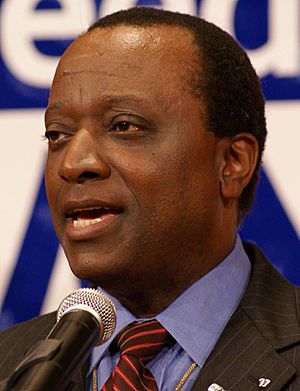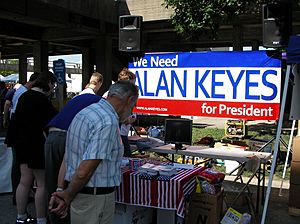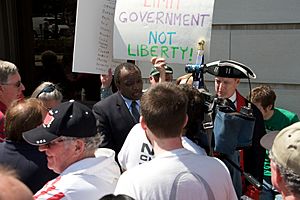Alan Keyes facts for kids
Quick facts for kids
Alan Keyes
|
|
|---|---|

Keyes in 2015
|
|
| 16th Assistant Secretary of State for International Organization Affairs | |
| In office November 13, 1985 – November 17, 1987 |
|
| President | Ronald Reagan |
| Preceded by | Gregory J. Newell |
| Succeeded by | Richard S. Williamson |
| Personal details | |
| Born |
Alan Lee Keyes
August 7, 1950 New York City, U.S. |
| Political party | Republican (before 2008, 2012–present) |
| Other political affiliations |
Constitution (2008) America's Independent Party (2008–2012) |
| Spouse |
Jocelyn Marcel
(m. 1979) |
| Children | 3, including Maya |
| Education | Cornell University Harvard University (AB, AM, PhD) |
Alan Lee Keyes (born August 7, 1950) is an American politician and diplomat. He served as the Assistant Secretary of State for International Organization Affairs from 1985 to 1987 under President Ronald Reagan. As a member of the Republican Party, Keyes ran for President of the United States in 1996, 2000, and 2008.
Keyes earned his Ph.D. from Harvard University. He began his career as a diplomat in the U.S. Foreign Service in 1979. He worked at the U.S. consulate in Mumbai, India, and later at the American embassy in Zimbabwe.
Besides running for president, Keyes also ran for the U.S. Senate. He was the Republican nominee in Maryland in 1988 and 1992. In 2004, he ran for the Senate in Illinois against Barack Obama. Keyes lost all three of these elections.
Keyes has also worked in media. He hosted a radio show in the 1990s and a television show on MSNBC in 2002. He has been a longtime writer for the website World Net Daily.
Contents
Early Life and Schooling
Alan Keyes was born in St. Albans, Queens, New York. His father was a U.S. Army sergeant, so his family moved often. Keyes lived in many different states and also in Italy.
After high school, Keyes went to Cornell University. He later transferred to Harvard University, where he earned his bachelor's degree in government. He stayed at Harvard to get his Ph.D. in government in 1979. His studies focused on the U.S. Constitution and political ideas.
Career as a Diplomat
Before finishing his Ph.D., Keyes started working for the United States Department of State. This department handles relationships with other countries. In 1979, he was sent to work in Mumbai, India. A year later, he was assigned to the U.S. embassy in Zimbabwe.
In 1983, President Ronald Reagan made Keyes an Ambassador to a part of the United Nations called the Economic and Social Council. Two years later, Reagan appointed him as Assistant Secretary of State for International Organization Affairs. He held this job until 1987. In this role, Keyes helped carry out U.S. policies at the United Nations.
President Reagan once praised Keyes for his work. He said Keyes did an "extraordinary job" defending the country. After leaving the government, Keyes worked for the American Enterprise Institute, a research group. He also served as president of a group called Citizens Against Government Waste.
Political Campaigns
Runs for the U.S. Senate
Keyes ran for the United States Senate three times. In 1988, he ran in Maryland but lost to the incumbent, Paul Sarbanes.
He ran again in Maryland in 1992. He won the Republican primary but lost the main election to Barbara Mikulski.
In 2004, the Republican Party in Illinois asked Keyes to run for the Senate against Barack Obama. This happened after their first candidate, Jack Ryan, withdrew from the race. Keyes had never lived in Illinois, which caused some debate. He lost the election to Obama.
Presidential Campaigns
Keyes tried to become the Republican nominee for president three times.
1996 and 2000 Elections
In 1996, Keyes entered the Republican presidential race. He was known for his strong views on social issues. He often debated other candidates about their beliefs.
He ran again in 2000. He participated in several televised debates with George W. Bush and John McCain. His best result was in the Utah primary, where he finished with 20% of the vote.
2008 Election
Keyes announced his third run for president in September 2007. He took part in a few Republican debates. He often spoke about his conservative views on topics like taxes and prayer in schools.
He did not win much support in the early Republican primaries. After John McCain became the clear Republican nominee, Keyes left the party. He then tried to get the presidential nomination of the Constitution Party but was unsuccessful.
Finally, he ran as a candidate for a smaller party called America's Independent Party. He was on the ballot in a few states and finished seventh in the national election.
Media and Public Speaking
Keyes has had a long career in media. From 1994 to 1998, he hosted a radio talk show called The Alan Keyes Show: America's Wake-Up Call.
In 2002, he had his own TV show on MSNBC called Alan Keyes Is Making Sense. The show was canceled after a few months due to low ratings. On his show, he often discussed his support for Israel.
Keyes has also been an active public speaker and writer. He has written essays on the U.S. Constitution and religion. He appeared in the 2006 movie Borat as himself, being interviewed by the main character.
In 2009, Keyes was arrested during a protest at the University of Notre Dame. He was protesting President Barack Obama's speech at the university's graduation ceremony.
Personal Life
Keyes is married to Jocelyn Marcel Keyes. They have three children: Francis, Maya, and Andrew. Keyes is a traditional Catholic.
Obama Citizenship Lawsuit
On November 14, 2008, after Barack Obama was elected president, Keyes filed a lawsuit. He challenged whether Obama was eligible to be president. The lawsuit asked for proof that Obama was a "natural born citizen" of the United States, as the Constitution requires.
After Obama's inauguration, Keyes continued to question his eligibility. He called Obama a "usurper" and refused to call him president.
See also
 In Spanish: Alan Keyes para niños
In Spanish: Alan Keyes para niños
- List of African-American United States Senate candidates
- List of African-American United States presidential and vice presidential candidates
Images for kids








